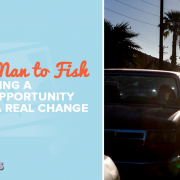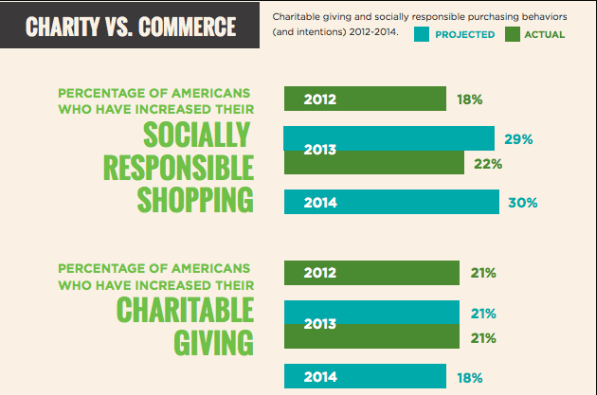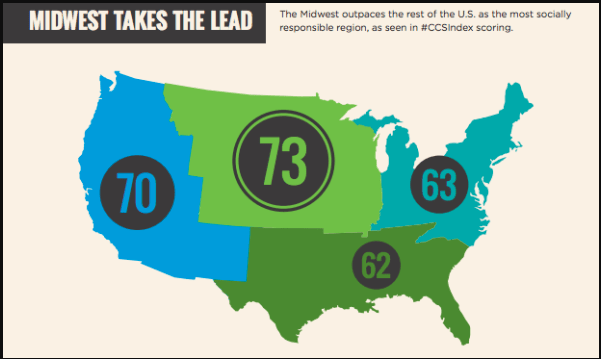Teach a Man to Fish – How Creating A Business Opportunity Can Make A Real Change
In 2014, a study came out that suggested that Americans want to give back with their purchases, not charity.
The results of the survey, conducted by a socially responsible marketing consultancy Good.Must.Grow, show these trends for the second year in a row. In a poll of 1,010 Americans, the group found that about 30% consumers planned to increase their purchases from socially responsible companies in the coming year (compared to 29% last year). Meanwhile, only 18% plan to increase charitable giving in 2014, a decline from 21% in 2013.
Here’s a graph of these findings from Fast Company paired with those from 2012 and thosethat were projected for the previous year in 2013.
Furthermore, the Midwest was actually the most prone to buy when they knew that part of the proceeds were going towards a good cause.
If you want to check out more about this study here’s the article in Fast Company.
Anyhow, keep this in mind for a second. I have a couple of other things to share with you.
Direct Trade: A Form of Cause Centric Commerce
Now why do I bring this up? Well, you might remember a book that I started when I was in Honduras, which I’ve since finished. It was called Meaningful Work: A Quest to Do Great Business, Find Your Calling, and Feed Your Soul by Shawn and Lawren Askinosie.
In its pages are several key points.
One of which is their use of direct trade in their business.
Now when I say direct trade, that’s not to confuse it with fair trade. Totally not the same thing. And in fact, fair trade isn’t as great as it sounds. In the book, Shawn says the farmers aren’t compensated as much as we’d expect them to be.
Direct trade, on the other hand, is a much better deal for everyone involved. Farmers get compensated more and the actual trading agreements are determined by those involved – not a third party.
Because of this, Askinosie Chocolate has the ability to have a hand in helping a couple of developing countries get off the ground. Not only do they help the farmers themselves by doing business with them, but they also help their communities. This is done through numerous programs.
Shawn has a saying (or perhaps a company motto) that goes “It’s not about the chocolate, it’s about the chocolate.”
Without the farmers that he trades with, his business simply wouldn’t be the same.
It’s the cocoa bean farmers that give his company a heart. But it was Shawn and his company that gave the farmers purpose and a way to actually improve their way of life.
Business On the Border
In Mexico, they don’t have government programs that pay for livelihoods. If you want food, you’re going to have to work for it.
Most of the rest of the world is like this – including those countries that Shawn does business with.
This past weekend, I saw first hand what this situation does for people. It drives the market and stimulates the local economy.
Specifically, in this instance, it was in the border towns of Calixico and Mexicali.
On both sides, people were selling goods to those of us who were waiting in line to cross the border. These goods were anything from fruit and pastries up to small digital devices, carvings, as well as NFL and NBA themed blankets.
By far, though, the Mexico side had more of these true entrepreneurs.
I think there’s two reasons for this: 1.) They HAVE to make an income because they’re not relying on the government for a handout. 2.) They probably don’t have as many restrictions as we do on the US side.
Regardless, while we were waiting in line on the Mexican side to get across, Maria and I noticed that a good majority of these vendors were young people. And when I say young, I mean anywhere from 6 years old up to folks in their mid 20’s.
By the end of our 2 and a half hour wait to cross, we ended up buying items from a couple of the kids.
One, I have to say, was a great hustler already at age 10.
This kid was awesome. He was was selling chopped coconuts with the water in a plastic bag.
We watched him perform the entire prep process. From chopping the coconuts, to pouring the water, and then slicing the coconut flesh itself. Once he had a couple cut up, he’d come out into the street with everyone else.
Not only did he help us buy from him by giving us great value with all the prep he had done, but he was a heck of a salesman.
The coconuts were priced at 4 dollars. However, we didn’t have exact change.
As I was looking through my wallet, he apparently noticed that I had a 20 in there.
He said “Oh hey, I have change!” He even wanted me to count it when he gave it to me!
I love it. Not only did he show hustle to prep the coconuts as well as he did, but he was aware enough to help us get over the obstacles of making the sale.
The Magic of Hustling
Now, the reason I brought up the study at the beginning of this post is because I want to illustrate something.
The farmers that Askinosie Chocolate works with and the folks that were selling items on the street in Mexicali – they have something in common. They’re not looking for handouts – they’re not beggars. Instead they’re out making things happen by being members of the free market.
I’m guessing that they’re both getting more of an income from being part of this free market and solving problems then if they were simply asking for money.
Not only that, but they probably have a bit of pride in the work they do. They’re able to actually help provide for their families.
As someone from the midwest, I can understand why our socially responsible buying habits have gone up. I’d sooner help contribute to someone who’s working towards something meaningful (even if it’s just selling items in the street) than give to a charity. For one, there’s direct impact there (like Shawn does with his farmers).
But the other thing is people increasingly want a return for the money they worked for themselves.
Action Steps
So here’s something I’m going to challenge you guys with. Instead of rewarding those who need help through charity, help people figure out a way to generate income through their own skills. Help them figure out a way to bring in additional income to build themselves and potentially their community.
In the states, that might be something like helping homeless people become produce vendors. Or perhaps, you can help set up an organization where you rehabilitate these folks to be productive members of society. (This is actually being done by a nonprofit at C317.)
Heck, maybe it’s helping farmers with their digital marketing and helping them sell to customers on the other side of the country.
The thing is, there are people who you could help that want to work their way out of their situation. They’re simply looking for the opportunity to do so.
Look for those people and help them up! I believe that you’ll get more fulfillment than you would if you were to simply donate.












